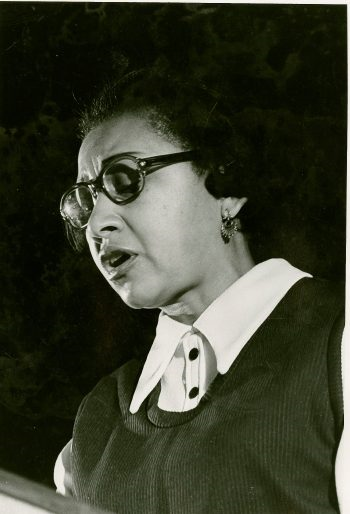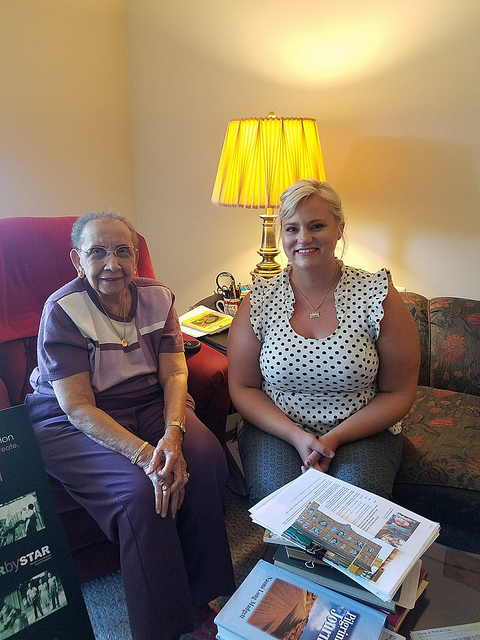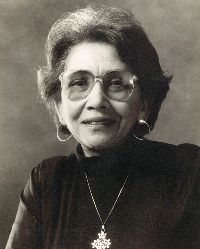This content is being reviewed in light of recent changes to federal guidance.
In Memoriam: Naomi Long Madgett
Categories: HBW, Gems, Obituaries
“If I can help somebody as I pass along”: Remembering the Life and Work of Naomi Long Madgett

On November 4, 2020, we lost Detroit Poet Laureate, Lotus Press founder, and lifelong educator, Naomi Long Madgett. With a career that spanned over five decades, Madgett’s work was dynamic and unencumbered by critical expectations—especially critical expectations of Black writers. She published her first volume of poetry, Songs to a Phantom Nightingale (1941), when she was just seventeen years old, and she published at least one volume of poetry in every decade (minus the 1960s) until her last collection, Connected Islands, was published in 2004. Early in her career, Madgett was mentored by both Countee Cullen and Langston Hughes, and their exchanges over what it means to be a Black writer—made famous in Hughes’s seminal essay “The Negro Artist and the Racial Mountain” (1926)—was a crucial debate that inflected Madgett’s development of her own poetry. Madgett was also a founding member of the Boone House group of poets in Detroit in the 1960s that included fellow poets Margaret Danner, Dudley Randall, and Oliver LaGrone. As an educator both in the Detroit Public School system as well as at Eastern Michigan University, Madgett was a pioneer in the creation of the first African American literature course for the Detroit Public School system and even wrote her own creative writing textbook, A Student’s Guide to Creative Writing (1980). Her concern with overly-restrictive expectations for Black writers is an imperative that she not only addressed in her own work but was also the impetus behind her creation of Lotus Press in 1972 (now merged with Dudley Randall’s Broadside Press) after she was unable to find a publisher for her fourth collection of poetry, Pink Ladies in the Afternoon. In 2001, Madgett was named the Detroit Poet Laureate, and in 2012 she was awarded the Kresge Eminent Artist Award, the highest artistic honor in the state of Michigan.

Morgan McComb visits Naomi Long Madgett at her house to discuss her life’s work.
In July 2017, I had the distinct pleasure of interviewing Madgett at her home in Detroit, Michigan. Our early correspondence through e-mail distinguished her as a committed protector and historian of her own work and the work of those she mentored. Her encyclopedic memory of her career was both impressive and necessary for, almost 70 years after her first publication, the published critical engagement with her work remains slim, though it should be noted that her poems—notably the poem “Midway”—are in many anthologies including Dudley Randall’s foundational The Black Poets (1971). (During our interview, she told me that “Midway,” her most anthologized poem, is, interestingly enough, the least favorite of her poems.) During the course of our afternoon together, for almost six hours, she told me stories like holding on to some parking change Gwendolyn Brooks gave her for years after they first met; later in their lives, Brooks and Madgett became close friends, as evidenced by the extensive written correspondence between them, currently in Madgett’s archives at the University of Michigan in Ann Arbor. A constant refrain in the interview was her career-long battle against what others told her she should write as a Black poet. In her autobiography Pilgrim Journey (2006) she writes that she struggled to find an audience for her “quiet, reflective poetry that dealt with race in more subtle ways” against the backdrop of explicitly political artistic movements such as the Black Arts Movement (313). Her favorite hymn, “If I Can Help Somebody” by Mahalia Jackson, epitomizes her imperative as a publisher and editor. For despite her own work lacking an enthusiastic reception, Madgett devoted her career as an editor at Lotus Press to providing a space for other Black writers to find a publishing haven, especially when they, just as she, had been turned away by other publishers.

Naomi Long Madgett Photo credit: Unknown
Because Madgett’s work is prolific both in quantity and thematic scope, it is more difficult to characterize. Yet the difficulty we encounter is what makes her distinctive poetic perspective all the more important to document. Madgett eschews strict dictums for poetry because, as she told me in our interview, “the core principle [of the poem] is always the same, and yet the reader brings something of his or her own experience into the poem so that it means something different [to everyone].” Madgett’s poetry makes space to explore the expansiveness of artistic identity in flux. Constant evolution: this is Madgett’s imperative as a poet, an editor, an educator, and a human being.
And so I hope, in the midst of a political moment where we are striving to recognize the essential, foundational, and revolutionary contributions of Black women, we can commit ourselves to an engagement with and love of Madgett’s poetry, in her absence, that she undoubtedly has always deserved.
More on Naomi Long Madgett